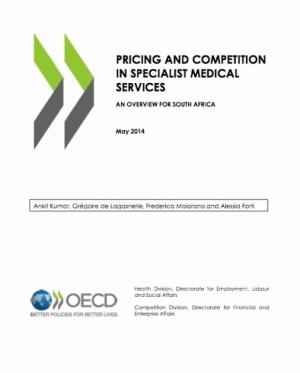Pricing and competition in specialist medical services, an overview for South Africa
The Organization for Economic Co-operation and Development (OECD) has officially released a report on Pricing and competition in specialist medical services on a seminar organized by the WHO South Africa on Tuesday 17 June 2014. This paper argues that South Africa should separate the task of establishing a schedule of medical services from negotiations over overall payments to medical professionals. It covers international experiences on the pricing of specialist medical services, competition policy and select models where the public payer draws on the private sector to help meet population needs.
The key points which Ankit Kumar and Valerie Paris from the OECD raised on the seminar are:
South Africa has a higher share of spending on private voluntary health insurance than any OECD country, and this serves a smaller share of the population.
In most OECD countries the public sector tends to have some form of price setting for specialist medical services, this is used to purchase services from the private sector and can provide benchmarks for private insurers as well.
Regulation in OECD countries generally enables collective bargaining on hospital prices. Competition policy distinguishes between public insurers with a social purpose and private insurers, and allows co-ordination among providers under specific circumstances.
Developing credible prices and large increases in public spending have been common to OECD countries that have used private sector facilities to expand access to hospitals in recent years.
Pricing and competition in specialist medical services: An overview for South Africa



